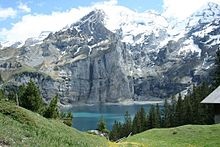|
|
| |
|
|
| |
|
|
|
|
| |
 |
| Oeschinen Lake in
the Swiss Alps. |
Lakes
A lake (from Latin lacus) is a large body of water
(larger and deeper than a pond) within a body of land.
As a lake is separated from the ocean, it is not a sea.
Some lakes are very big, and people in the past
sometimes called them seas. Lakes do not flow like
rivers, but many have rivers flowing into and out of
them.
Most lakes on the surface of the Earth are fresh water
and most are in the Northern Hemisphere. More than 60%
of the lakes of the world are in Canada. Finland is
known as The Land of the Thousand Lakes (there are
187,888 lakes in Finland, of which 60,000 are large).
Many lakes are man-made reservoirs built to produce
electricity, for recreation, or to use the water for
irrigation or industry, or in houses.
If there are not rivers flowing out of the lake (see
Endorheic basin), or they are few and small, the lake
loses water only by evaporation or because the water
flows through the soil pores. Where the water evaporates
rapidly and the soil around the lake has a high salt
level, as in very dry places, the water of the lake has
a high concentration of salt and the lake is called a
salt lake. Examples of salt lakes are the Great Salt
Lake, the Caspian Sea, the Aral Sea, and the Dead Sea. |
|
|
Largest lakes by continent |
- Africa - Lake Victoria, also the
second largest freshwater lake on Earth. It is one of
the Great Lakes of Africa.
- Antarctica - Lake Vostok.
- Asia - Lake Baikal is the largest
lake that is completely in Asia. The Caspian Sea, the
largest lake on Earth, is on the Europe-Asia border (an
artificial border) and so both continents share this
lake.
- Australia - Lake Eyre, that most of
the time is without water; it takes water when it rains
a lot.
- Europe - Lake Ladoga, followed by
Lake Onega, both in northwestern Russia.
- North America - Lake Superior.
- South America - Lake Maracaibo but
it is like a bay because it has a wide opening to sea.
The largest freshwater lake of South America is Lake
Titicaca, which is also the highest body of water on
Earth at 3,821 m (12,507 ft) above sea level where boats
can travel.
|
|
|
Notable lakes |
- The largest lake in the world by
area is the Caspian Sea, with 394,299 km². The largest
freshwater lake by area is Lake Superior (82,414 km²),
part of the Great Lakes.
- The longest freshwater lake is Lake
Tanganyika, with a length of about 660 km. Lake Baikal
is the second longest (about 630 km from tip to tip).
- The deepest lake is Lake Baikal in
Siberia, with a bottom at 1,637 m (5,371 ft). Lake
Tanganyika (1,470 m) is the second deepest lake.
- The highest lake of the world is a
small lake (pond) without a name on Ojos del Salado at
6,390 m (20,965 ft). But the highest navigable lake is
Lake Titicaca in Peru and Bolivia at 3,812 m (12,507
ft).
- The lowest lake of the world is the
Dead Sea, bordering Israel and Jordan at 418 m (1,371
ft) below sea level. It is also one of the lakes with
highest salt concentration.
- Lake Enriquillo in Dominican
Republic is the only saltwater lake in the world where
crocodiles live.
|
|
|
|
|
|
|
|
|
|
|
|
|
|
|
|
|
|
|
Search Fun Easy English |
|
|
|
|
|
|
|
|
|
|
|
|
|
|
|
About
Contact
Copyright
Resources
Site Map |